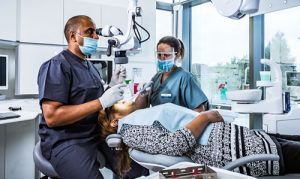Root Canal Infections
Bedford Endodontist, Dr Joseph Masih, explains how this dental condition is treated
 In today’s blog, we will take a look at a treatment that some of you may fear being told that you need to have. We are, of course, talking about a root canal procedure. There are many theories why there is more anxiety surrounding this treatment compared to others, but whatever the reason is, there is little doubt that it is one that patients hope to avoid. But fortunately those concerns are overstated.
In today’s blog, we will take a look at a treatment that some of you may fear being told that you need to have. We are, of course, talking about a root canal procedure. There are many theories why there is more anxiety surrounding this treatment compared to others, but whatever the reason is, there is little doubt that it is one that patients hope to avoid. But fortunately those concerns are overstated.
The good news for those that do need to have it is that most of the rumours you may have heard about it are not really true. This procedure should cause you no more discomfort than other treatments and, of course, you will have a local anaesthetic to keep any discomfort to an absolute minimum. At The Dental Centre Bedford, we will also check for the presence of abscesses and if any are found, they will be treated before we start treatment.
What causes infections in the root canal?
How do the root canals become infected? That is a good question as the canals are situated in the roots of the teeth which are seated in the jawbone. The problem arises when we get tooth decay, or the enamel of our teeth become cracked or chipped to the extent that it becomes compromised and enables bacteria to enter into the dentin layer below it. This part of the tooth is much more porous than the external enamel and allows bacteria to enter the root canals, causing the infection.
As the nerves of our teeth are located in the root canals, it is not uncommon for an infection to be quite painful and even the most nervous patient will usually contact our Bedford dental practice when this happens.
Root Canal Treatment
Other than removing the infected tooth, there is only one procedure available which can treat this problem and that is a root canal procedure. As we said at the start, a lot of people are scared of this treatment but it really is nowhere near as bad as you may have been led to believe. Before we start any treatment, you will have an x-ray so that we can see the location and extent of the infection site. This x-ray also enables us to see if an abscess is present. If any are found, these will be treated beforehand and your root canal treatment may be postponed to allow this to happen.
Following application of an anaesthetic, your dentist first accesses the top section of your tooth, in turn allowing access to the root canals where the infection lies. The infected ‘pulp’ contained in these canals will then be removed and the canals thoroughly cleaned to remove any remaining infection. A special type of filling called ‘gutta percha’ is then used to fill the canals. This is excellent for ensuring a secure seal so that bacteria can’t re-enter. In most cases, a crown will then be attached to your treated tooth, giving additional protection and strength as well as providing the treated tooth with a natural appearance.
Prognosis
Once your treatment has been completed, you will be left with a functional tooth, albeit one with no sensation due to the removal of the nerves that are contained in the now removed pulp. Although this means that you can’t experience pain in that tooth, it also means that you may be less aware about how much pressure you apply with it. This can create problems and may, in rare cases, cause the tooth to break. Because of this, we advise that you avoid using this tooth to bite down on harder foods to help minimise the risks of breakage.
How long a root canal treated tooth will last depends on each individual situation. With good care though, you might expect it to last somewhere in the region of 8 to 10 years although they can last much longer.
A root canal treated tooth should be looked after like any other and you should make sure that you brush it well and use dental floss to keep the gums clean. Although the newly added crown can’t decay, the rest of the natural tooth can. Gum disease is also a possibility so please make sure to maintain good gum health.
If you would like more information on this, or any other procedure, our team is always happy to help. You can contact The Dental Centre Bedford by calling our reception team on 01234 819868.
